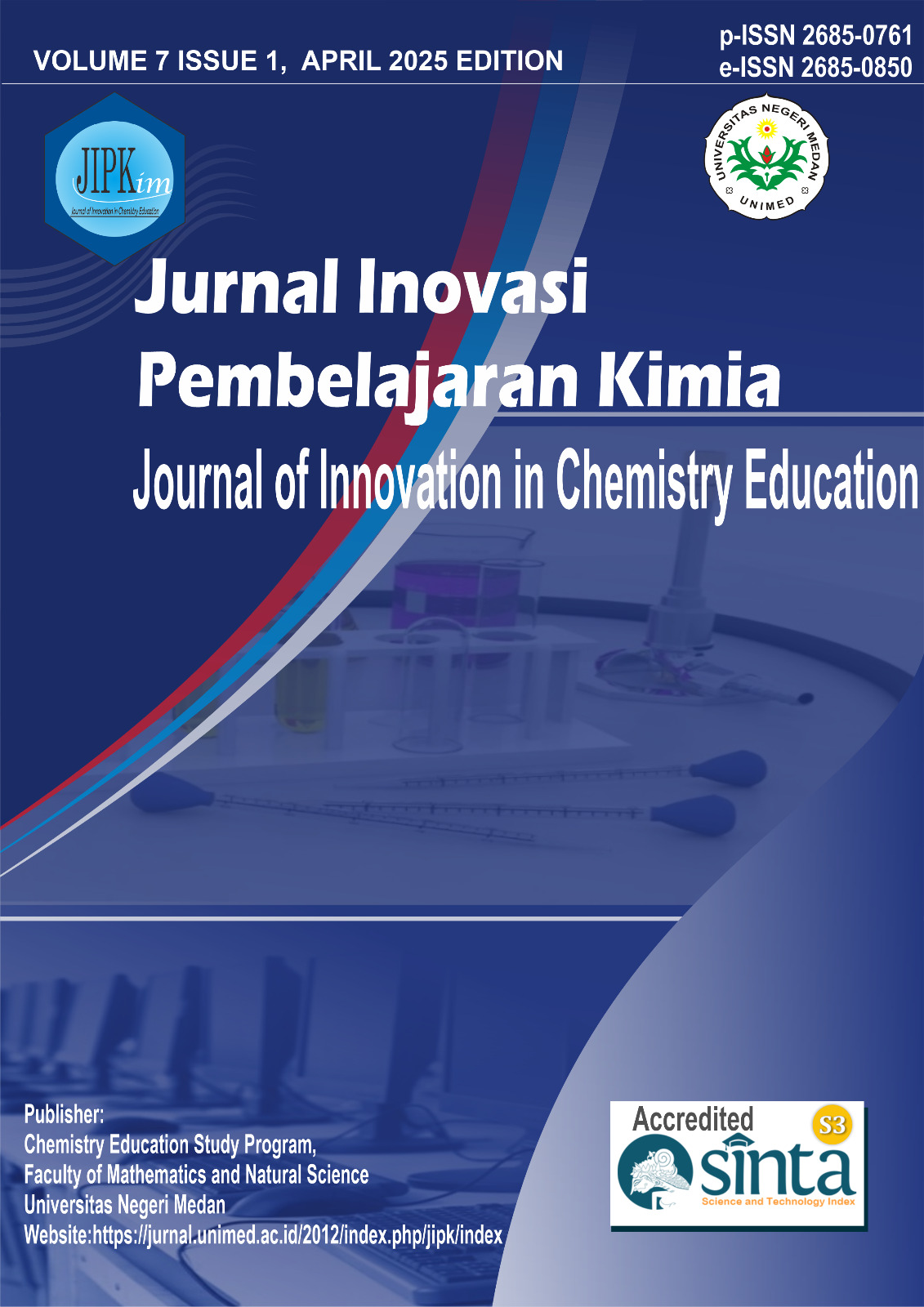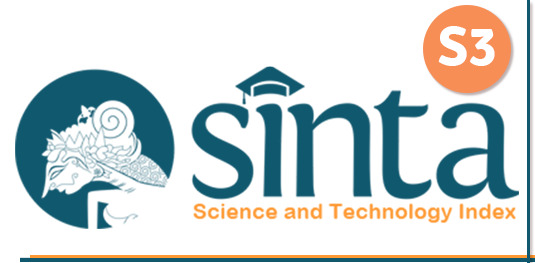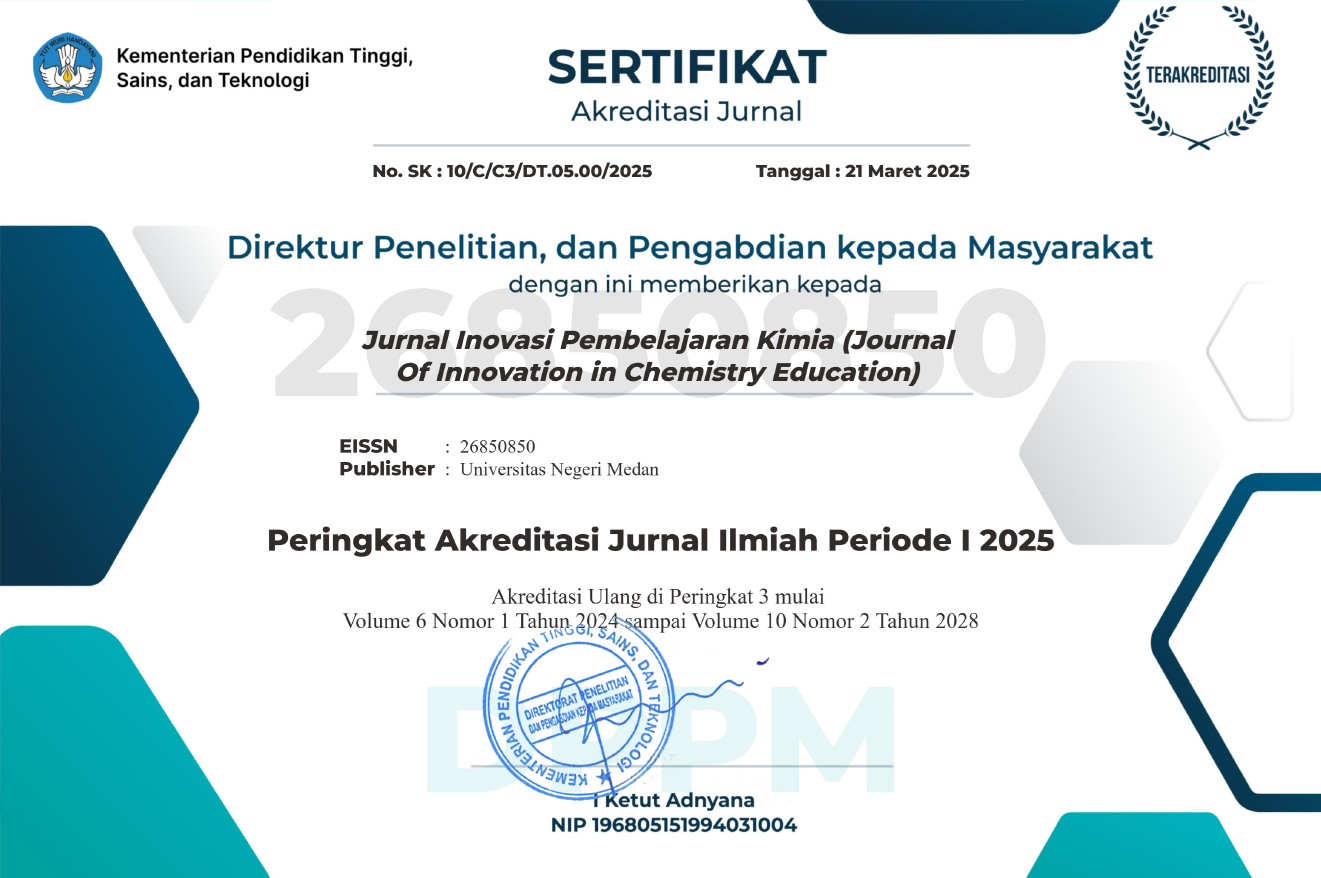Developing a Problem-Based Student Worksheet Integrated with Scientific Literacy in Thermochemistry
DOI:
https://doi.org/10.24114/jipk.v7i1.67988Keywords:
teaching material development, LKPD, problem-based learning, scientific literacy, thermochemistryAbstract
The purpose of this study was to determine the feasibility and student response to the development of a Problem-Based Integrated Science Literacy Student Worksheet (LKPD) for Thermochemistry. The study used Research and Development (R&D) with the 4D development model (Define, Design, Develop, Disseminate). Purposive sampling was used to select 35 students from class XI IPA 1 of SMA Negeri 1 Bangun Purba as the experimental class. The instruments used were a BSNP-based feasibility assessment sheet and a student response questionnaire. The results showed that the developed LKPD was valid and highly suitable for use. This was demonstrated by the average feasibility score of 3.62. The results of the student response questionnaire showed an average score of 3.65, indicating a high level of student interest. It can be concluded that the development of a Problem-Based Integrated Science Literacy Student Worksheet (LKPD) integrated with science literacy is highly effective as a supplementary teaching material in schools because it can improve students' critical thinking skills and motivation to learn thermochemistry.References
Artalia, D., Sari, A., & Fitraini, D. (2022). Pengembangan Lembar Kerja Peserta Didik (LKPD) Berbasis Model Discovery Learning Terintegrasi Nilai-Nilai Keislaman Pada Materi Teorema Pythagoras SMP/MTs. Juring (Journal for Research in Mathematics Learning), 5(4), 351–358. https://doi.org/10.24014/juring.v5i4.18970
Elpita, Enawaty, E., & Lestari, I. (2023). Pengembangan LKPD Berbasis Penemuan Terbimbing Pada Materi Ikatan Kimia Kelas X Mipa. CHEDS: Journal of Chemistry, Education, and Science, 7(2), 198–203.
Farida, G., Engol, S., Tindangen, M., & Yulliono. (2024). Respon Peserta Didik terhadap Penggunaan E-LKPD Liveworksheets pada Materi Transformasi Geometri. Jurnal Inovasi Refleksi Profesi Guru, 1(1), 8–14. https://doi.org/10.30872/jirpg.v1i1.3320
Handayani, G., Adisyahputra, & Indrayanti, R. (2018). Hubungan Keterampilan Proses Sains Terintegrasi dan Kemampuan Membaca Pemahaman Terhadap Literasi Sains Pada Mahasiswa Calon Guru Biologi. BIOSFER :Jurnal Pendidikan Biologi (BIOSFERJPB), 11(1), 21–31. https://doi.org/https://doi.org/10.21009/biosferjpb.11-1.3
Hanifa, A., & Andromeda. (2025). Pengembangan LKPD Asam Basa Berbasis Problem Based Learning Terintegrasi Culturally Responsive Teaching untuk Fase F SMA. Jurnal Pendidikan MIPA, 15(1), 31–39. https://doi.org/10.37630/jpm.v15i1.2093
Hidayah, R., Fajaroh, F., & Narestifuri, R. E. (2021). Pengembangan Model Pembelajaran Collaborative Problem Based Learning Pada Pembelajaran Kimia di Perguruan Tinggi. QALAMUNA: Jurnal Pendidikan, Sosial, Dan Agama, 13(2), 503–520. https://doi.org/10.37680/qalamuna.v13i2.1016
Lestari, Y. W., Hairida, Sartika, R. P., Enawati, E., & Muharini, R. (2022). Pengembangan Lembar Kerja Peserta Didik (LKPD) Berbasis Problem Based Learning (PBL) pada Materi Koloid. Edukatif : Jurnal Ilmu Pendidikan, 4(4), 5342–5351. https://doi.org/10.31004/edukatif.v4i4.3227
Meilasari, S., M, D., & Yelianti, U. (2020). Kajian Model Pembelajaran Problem Based Learning (PBL) Dalam Pemeblajaran Di Sekolah. Bioedusains : Jurnal Pendidikan Biologi Dan Sains, 3(2), 195–207. https://doi.org/https://doi.org/10.31539/bioedusains.v3i2.1849
Munthe, S. P., & Suyanti, R. D. (2024). The Impact of the PBL Models Helping iSpring Presenters on Student HOTS Literacy on Reaction Rate. Jurnal Inovasi Pembelajaran Kimia (Journal Of Innovation in Chemistry Education), 5(2), 148–154.
Nurmasita, Enawaty, E., Lestari, I., Hairida, & Erlina. (2023). Pengembangan e-LKPD Berbasis Problem Based Learning (PBL) pada Materi Reaksi Redoks. Jambura Journal of Educational Chemistry, 5(1), 11–20. https://doi.org/10.34312/jjec.v5i1.15991
Nuroctaviani, T., Murniati2, D., & Milama, B. (2023). Pengembangan Lkpd Berbasis Pendekatan Saintifik Pada Konsep Koloid: Praktikum Penjernihan Air Menggunakan Kitosan Dari Cangkang Kepiting (Scylla Serrata). UNESA Journal of Chemical Education, 12(1), 67–74. https://doi.org/10.26740/ujced.v12n1.p67-74
OECD. (2017). PISA for Development Assessment and Analytical Framework: Reading, Mathematics and Science,. OECD Publishing.
Panggabean, F. T. M., Silitonga, P. M., Purba, J., Jasmidi, & Purba, R. A. (2023). Analysis Student Motivation and Learning Outcomes by Apllying Problem Based Learning and Discovery Learning Models. Jurnal Inovasi Pembelajaran Kimia (Journal Of Innovation in Chemistry Education), 5(1), 11–16. https://doi.org/https://10.24114/jipk.v 5i1.42419
Panggabean, F. T. M., Silitonga, P. M., & Sinaga, M. (2022). Development of E-Modules to Improve Students’ High Order Thinking Skills. AIP Conference Proceedings, 2659(1), 070004. https://doi.org/10.1063/5.0114397
Pulungan, A. N., & Sitepu, P. (2021). Pengembangan Modul Elektronik Berbasis Problem Based Learning(PBL) Pada Materi Larutan Elektrolit dan Non Elektrolit. Jurnal Inovasi Pembelajaran Kimia (Journal Of Innovation in Chemistry Education), 3(2), 201–207.
Purba, M. I., Syahputra, R. A., Purba, J., Sutiani, A., & Silitonga, and P. M. (2024). Analysis o f Student ’ s Learning Outcomes and Scientific Literacy Activities Using Guided Inquiry and Discovery Learning. Jurnal Inovasi Pembelajaran Kimia (Journal Of Innovation in Chemistry Education), 5(2), 102–111. https://doi.org/https://doi.org/10.24114/jipk.v5i2
Putri, R. Y., Erviyenni, & Herdini. (2024). Pengembangan Lembar Kerja Peserta Didik Elektronik (E-LKPD) Berbasis Problem Based Learning Menggunakan Liveworksheet Pada Materi Kimia Hijau Kelas X SMA/MA. Jurnal Pendidikan Kimia Undiksha, 8(2), 13–20. https://ejournal.undiksha.ac.id/index.php/JJPK
Roza, M. H., & Damanik, M. (2022). Pengaruh Model PBL Terhadap Keaktifan Siswa dan Hasil Belajar Kimia SMA/MA pada Materi Koloid. Jurnal Inovasi Pembelajaran Kimia (Journal Of Innovation in Chemistry Education), 4(2), 157–166. https://doi.org/10.24114/jipk.v4i2.36101
Ruaya, P. P., Kang, H. X., Reader, S., & Hidayat, T. (2022). Role of Teacher Competence to Implement the Independent Curriculum. International Journal of Science Education and Cultural Studies, 1(2), 94–108. https://doi.org/10.58291/ijsecs.v1i2.48
Sari, F. R., W, K. A., & Suhery, T. (2024). Pengaruh LKPD Berbasis Problem Based Learning Terhadap Hasil Belajar Siswa Pada Materi Struktur Atom Kelas X SMA. Jurnal Penelitian Pendidikan Kimia : Kajian Hasil Penelitian Pendidikan Kimia, 11(1), 45–55. http://repository.unp.ac.id/42957/1/B1_07_HIKMAH_ISTIQORI_19035177_2602.pdf
Simamora, K. F. (2022). Kemampuan HOTS Siswa Melalui Model PjBL Ditinjau dari Kemampuan Literasi Kimia Siswa. Jurnal Inovasi Pembelajaran Kimia (Journal Of Innovation in Chemistry Education), 4(1), 55–65. https://doi.org/10.24114/jipk.v4i1.33588
Sinaga, M., & Sagala, D. M. (2021). Pengembangan Modul Pembelajaran Kimia Berbasis Proyek Pada Pokok Bahasan Termokimia Untuk Kelas XI SMA. Jurnal Inovasi Pembelajaran Kimia (Journal Of Innovation in Chemistry Education), 3(2), 164–175. https://jurnal.unimed.ac.id/2012/index.php/jipk
Sinuraya, E., Susanti, N., Panggabean, F. T. M., & Rismawati, E. (2024). Analysis of Students’ Scientific Literacy Abilities with Application Problem Based Learning and Discovery Learning Models. Jurnal Inovasi Pembelajaran Kimia (Journal Of Innovation in Chemistry Education), 6(1), 92–99. https://doi.org/10.24114/jipk.v6i1.57048
Wajipalu, D., Suleman, N., Munandar, H., Pikoli, M., & Thayban. (2025). Pengaruh Model Pembelajaran Problem Based Learning (PBL) Terhadap Kemampuan Literasi Sains Peserta Didik Topik Laju Reaksi. Jurnal Entropi, 20.
Yase, I. M. D., Basuki, B., & Savitri, S. (2020). Berbasis Inkuiri pada Materi Sistem Sirkulasi di SMA Negeri 5 Palangka Raya. Jornal of Biological Science and Education, 1(1), 10–15. https://doi.org/10.37304













